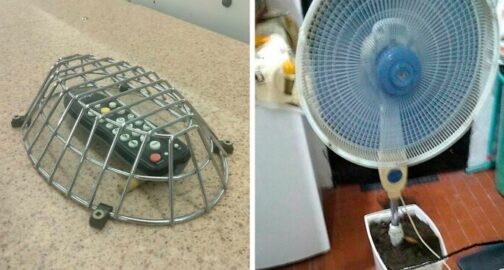
Rosacea is the "pink acne" disease that usually looks like broken blood vessels. Even though it's incurable, there are simple ways to get rid of its symptoms.
We at Bright Side created a list of some simple, yet effective remedies that are meant to help you in your fight against rosacea.
Rosacea consequences
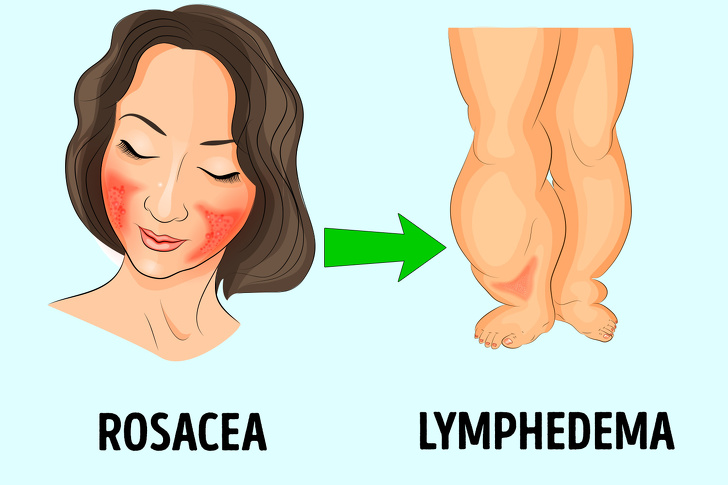
Typically, rosacea affects the face. It’s a long-term skin condition characterized by many symptoms like redness, swelling, the appearance of pimples, and dilated blood vessels. The skin can become too oily or too dry and in both cases, it also becomes extremely sensitive.
If not properly treated, rosacea may progress into lymphatic edema, the growth of sebaceous glands, stress, and an intolerance to cosmetics or bright sunlight. That’s why, though it can’t be cured for good, rosacea requires your attention and efforts to keep it at bay and reduce the visual effects of the condition. The following remedies can help you do that.
1. Diet revision to avoid triggers
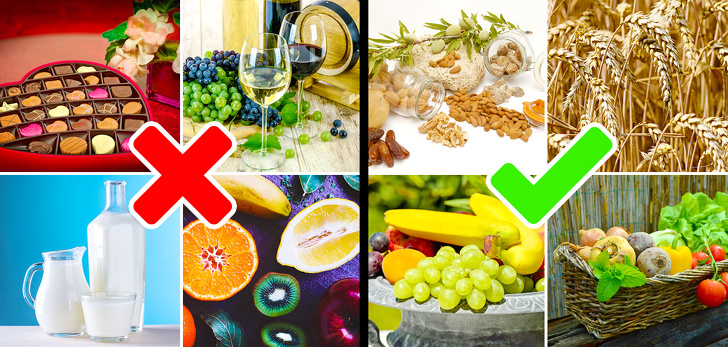
The very first thing to take into account if you have rosacea is your diet. The skin’s condition and appearance are directly connected to what you eat. In this case, “you are what you eat” couldn’t be closer to the truth. A molecular genetic analysis of your stool will give you a precise “picture” of what kind of bad bacteria live in your stomach and which good ones should be settled there.
The foods that worsen rosacea and promote the spread of it are called triggers. Dairy products, alcohol, coffee, hot spices, cigarettes, chocolate, soy sauce, citrus fruits, yeast, and some beans are the first on the list. It’s highly recommended to start keeping a food diary, monitoring what you eat and how it affects your skin condition. You should also include whole grains, nuts, vegetables, fruits, seeds, and pickled cabbage in your diet. These beneficial products will help to lessen dysbacteriosis and assist good microorganisms.
2. White vinegar
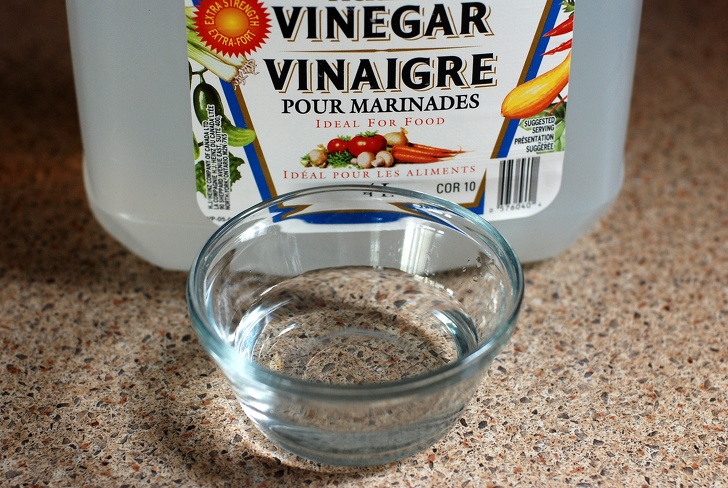
When trying natural remedies, always be careful and do a skin test on your arm to check for any irritation or possible sensitivity that can occur within (or even after) 24 hours.
White vinegar facial soaks and cleansing are the first thing we can recommend. Vinegar acts as a natural disinfectant and can also decrease the amount of yeast and bacteria that pile up on the skin’s surface. Take one part of regular table vinegar and dilute it with 6 parts of water. Use a cotton pad for a facial soak or a cotton disc to wipe your face with it.
3. Green tea and honey for masks
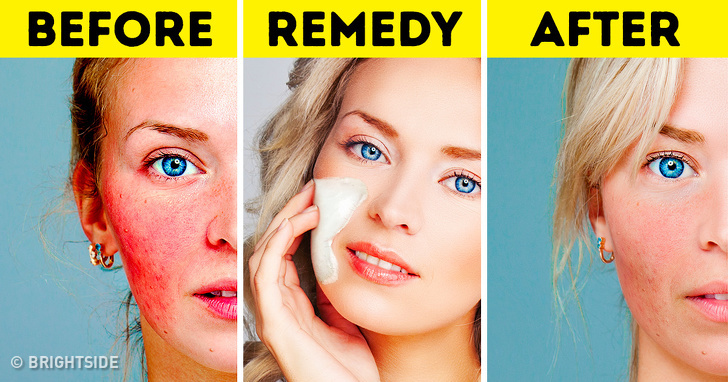
Make sure to use high quality (better loose than pre-packed) green tea and raw honey to make this kind of mask. The antibacterial and anti-inflammatory properties of raw honey are able to effectively reduce rosacea symptoms.
Take 1-2 tsp of cooled green tea (strongly brewed beforehand) and mix it with 2 tsp of raw honey. Use a soft cloth or a cotton ball to soak it in the solution. Put the cloth on the affected area of the skin for a few minutes. To make a thicker paste, you can use green tea powder (like matcha.)
4. Drink Aloe vera
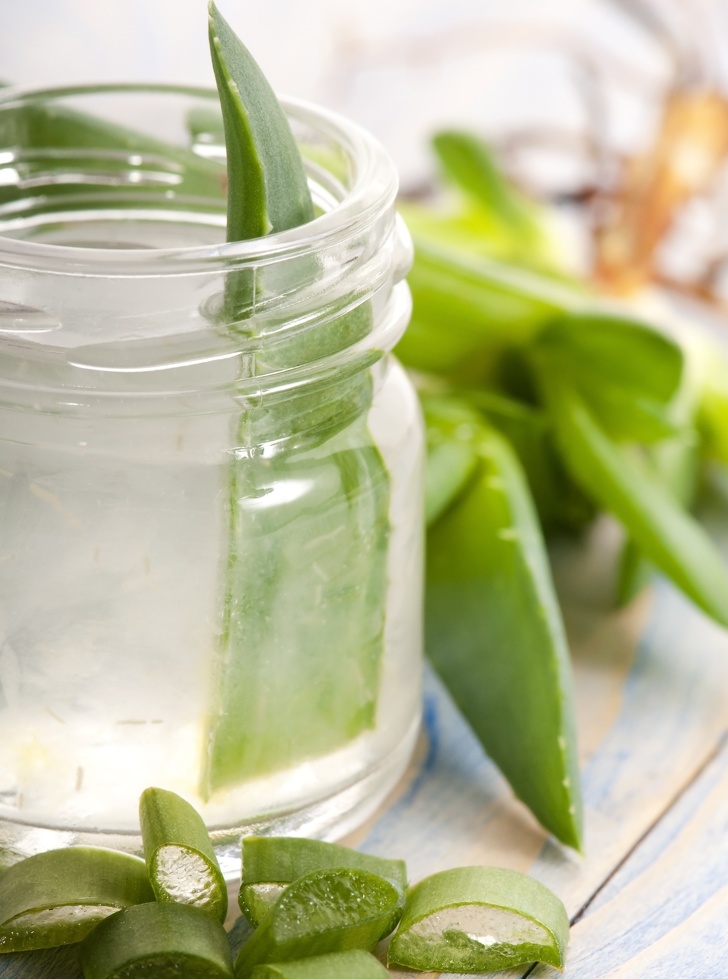
There are 2 ways to use aloe vera to treat the symptoms of rosacea. The first is to apply pure aloe vera gel on the affected areas. You can make a compress with it or rub it directly on the skin.
Thу second way is to drink aloe vera water. It’s rich in antioxidants and vitamins and it increases the total water intake amount in the intestines. Drinking water is essential for all of us, especially so for people with problems with their digestive tract. Water helps eliminate toxins in the intestines which reduces inflammation and lessens the symptoms of rosacea as a result.
5. Natural oils for cleansing
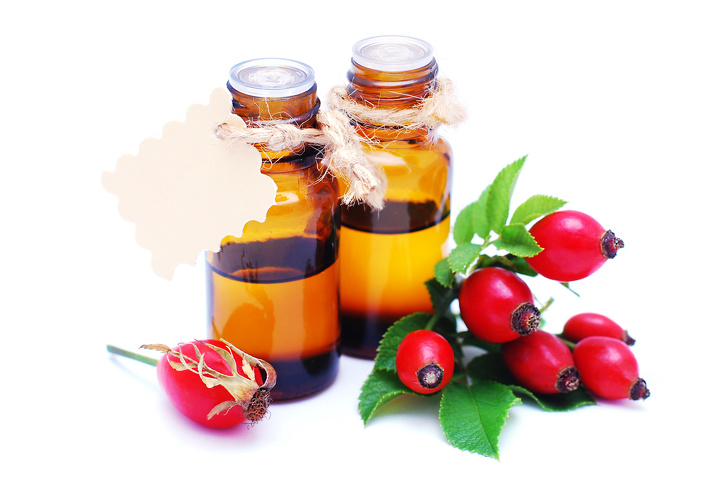
Mass-market skincare products are full of preservatives and potential irritants. But such cosmetics can’t help you get better-looking skin when you have rosacea. In the first place, avoid gel cleansers, cleansers with acidic exfoliating parts, and products with salicylic acid or benzoyl peroxide. Speaking of the last one, it is included in many products designed for acne-prone skin. But everything depends on your specific type of skin so you should always consult your doctor and try the product on a small area before giving it a full go.
What you should aim for when looking for skin products are mild cleansers like oils with anti-inflammatory properties. Evening primrose, tamanu oil, sea buckthorn, and rosehip oils are very helpful.
6. Essential oils to reduce inflammation
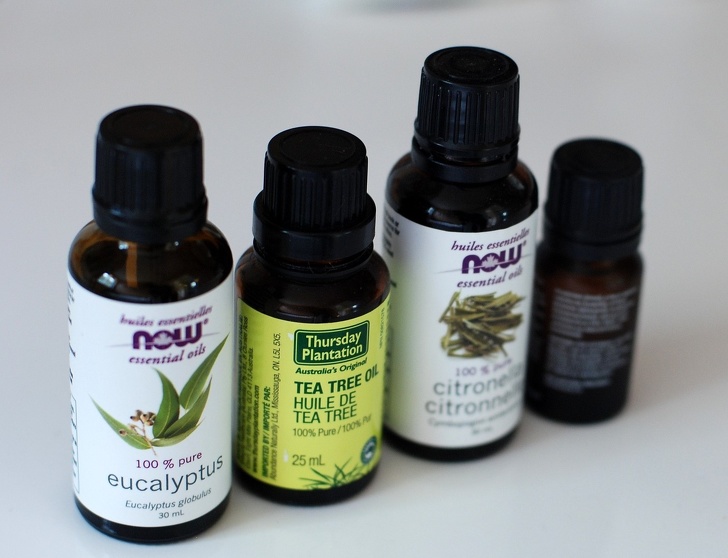
We’ve already mentioned that inflammation is one of the symptoms a person with rosacea suffers from. Essential oils help fight inflammation the same way they did when traditional medicine was the only option.
Things as tea tree, lavender, chamomile, rosemary, and eucalyptus serve several purposes — they reduce breakouts, fight bacterial growth, and reduce the amount of yeast. They also speed up blood circulation which improves blood flow to the affected area and promote wound healing.
7. Wearing sunscreen for protection
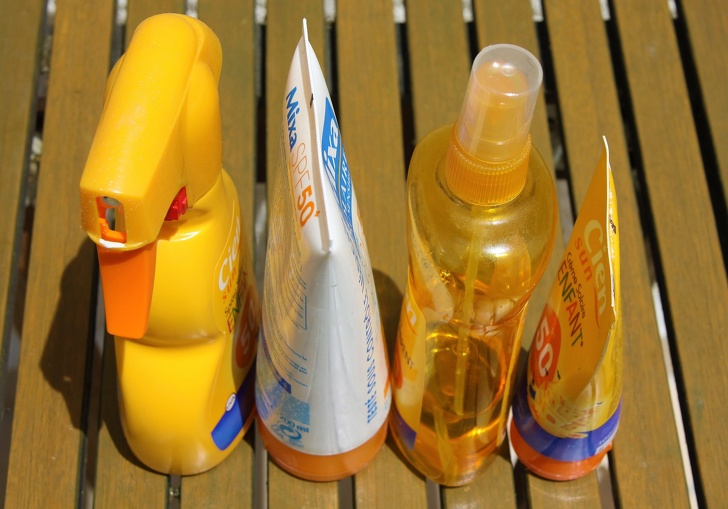
We’ve covered the topic of sun protection in this article, but here’s one more fact — rosacea symptoms get aggravated by UV light. Harmful sun rays also cause inflammation.
Yes, the intake of vitamin D or its production within the skin are essential for our well-being, but people with rosacea shouldn’t risk it for this purpose only. Wearing sunscreen will offer profound benefits for your skin condition by preventing flare-ups and protecting sensitive areas.
8. Coconut oil
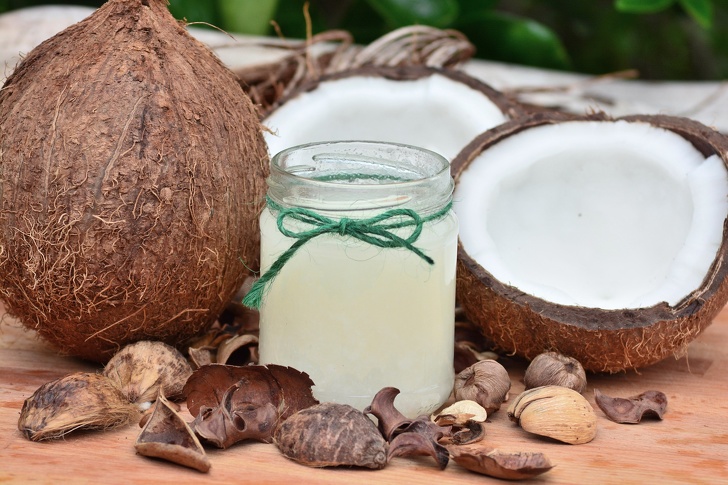
It was noted that rosacea is more likely to appear after you turn 30. It is also true that our skin starts getting dryer at this age which is why moisturizing is key. For one, it helps to restore the natural skin barrier and patients who regularly moisturize their skin report a decrease in overall dryness and sensitivity.
Coconut oil is a non-chemical and naturally-antibacterial substance with great moisturizing properties. It contains acids that are much less harmful compared to chemicals so they don’t cause breakouts and irritation. Plus, it’s relatively cheap, safe, and easy to get.
9. Less stress and more emotional stability
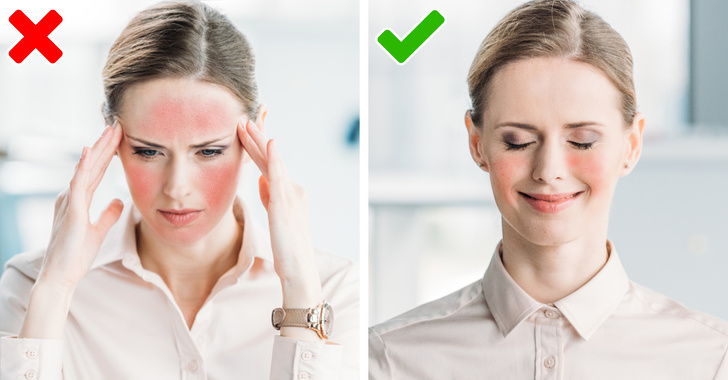
We won’t reinvent the wheel and say that stress is detrimental to our emotional well-being and general health. However, someone who suffers from rosacea might get caught in the vicious circle: patients suffer from the lack of self-confidence and are mentally challenged by their condition which creates more stress, which only makes it all worse.
Like trigger foods, stress is also a common cause of rosacea breakouts. Controlling stress levels is crucial when it comes to fighting this condition. Learn as much information as possible about the disease, consult several doctors, run all the necessary tests, and gain control over your condition. Focus on becoming knowledgeable and fully-armed against rosacea in your life and on your face.
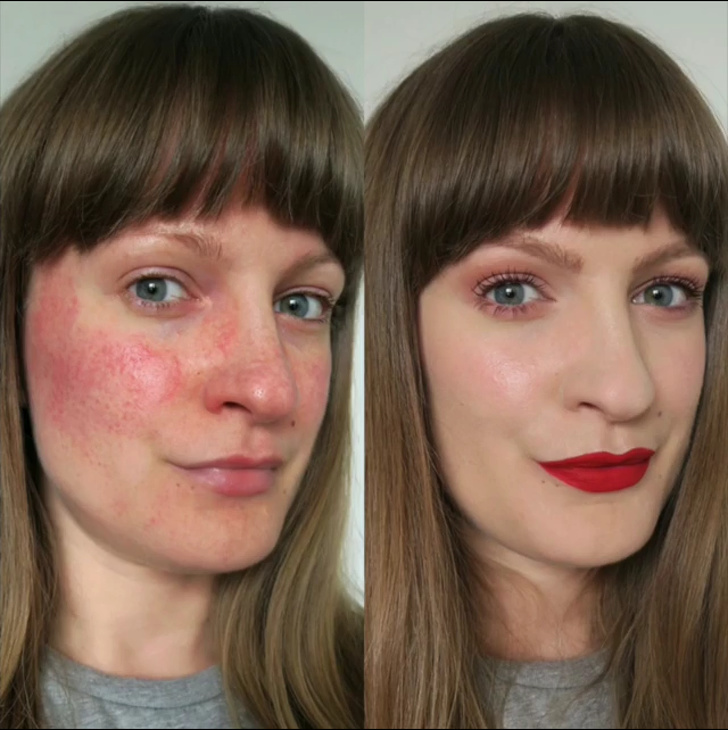
You can read more about rosacea here. And please, always remember that rosacea has nothing to do with poor hygiene, but it’s caused by internal reasons so don’t be ashamed of your condition. You’re not alone and science and medicine keep progressing each day.
Have you tried any of these methods? What has helped you? Share your stories with us in the comments section below!
Preview photo credit Talontedlex / instagram










